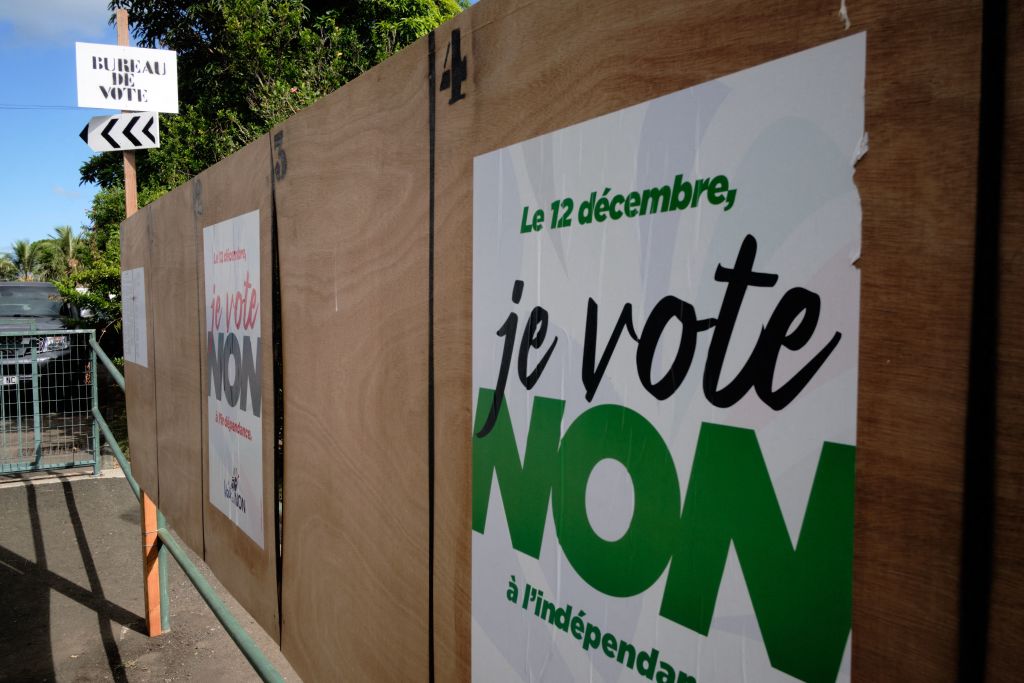New Caledonia holds final referendum on independence from France


A free daily email with the biggest news stories of the day – and the best features from TheWeek.com
You are now subscribed
Your newsletter sign-up was successful
Voters in the French territory of New Caledonia vote Sunday on whether to remain a part of France, The Associated Press reports.
New Caledonia, an archipelago in the South Pacific with a population of around 250,000, became a French colony in 1853, gained equal citizenship for its native inhabitants in 1957, received a degree of autonomy in 1988, and rejected previous independence referenda in 2018 and 2020. In 2018, 43.6 percent of voters backed independence. In 2020, the share of voters who favored independence rose to 46.7 percent.
Sunday's referendum is the third and final such vote permitted under the 1998 Nouméa Accord. The agreement also stipulates that, if voters choose for a third time to remain part of France, "the political partners shall meet to consider the situation thus created" and to re-negotiate the terms of New Caledonia's semi-autonomy.
The Week
Escape your echo chamber. Get the facts behind the news, plus analysis from multiple perspectives.

Sign up for The Week's Free Newsletters
From our morning news briefing to a weekly Good News Newsletter, get the best of The Week delivered directly to your inbox.
From our morning news briefing to a weekly Good News Newsletter, get the best of The Week delivered directly to your inbox.
France is eager to maintain its foothold in the South Pacific as Chinese influence in the region grows. The French military maintains a base in New Caledonia — one of only two French bases in the Pacific — and cooperates with the U.S., Australia, and New Zealand on various regional security initiatives.
The archipelago's pro-independence faction has called for a boycott of the referendum after the French government refused requests to postpone it. The text of the Nouméa Accord stipulates that the third referendum should be held in 2022.
New Caledonia is not the only former colony reckoning with its past. Last month, after protests broke out in the French Caribbean island of Guadeloupe, France's minister for overseas territories, Sebastien Lecornu, said he was open to granting the island greater autonomy, Reuters reported.
During the same month, Barbados, a former British colony also located in the Caribbean, cut ties with the British monarch and officially became a republic.
A free daily email with the biggest news stories of the day – and the best features from TheWeek.com
Grayson Quay was the weekend editor at TheWeek.com. His writing has also been published in National Review, the Pittsburgh Post-Gazette, Modern Age, The American Conservative, The Spectator World, and other outlets. Grayson earned his M.A. from Georgetown University in 2019.
-
 The EU’s war on fast fashion
The EU’s war on fast fashionIn the Spotlight Bloc launches investigation into Shein over sale of weapons and ‘childlike’ sex dolls, alongside efforts to tax e-commerce giants and combat textile waste
-
 How to Get to Heaven from Belfast: a ‘highly entertaining ride’
How to Get to Heaven from Belfast: a ‘highly entertaining ride’The Week Recommends Mystery-comedy from the creator of Derry Girls should be ‘your new binge-watch’
-
 The 8 best TV shows of the 1960s
The 8 best TV shows of the 1960sThe standout shows of this decade take viewers from outer space to the Wild West
-
 Judge orders Washington slavery exhibit restored
Judge orders Washington slavery exhibit restoredSpeed Read The Trump administration took down displays about slavery at the President’s House Site in Philadelphia
-
 Kurt Olsen: Trump’s ‘Stop the Steal’ lawyer playing a major White House role
Kurt Olsen: Trump’s ‘Stop the Steal’ lawyer playing a major White House roleIn the Spotlight Olsen reportedly has access to significant US intelligence
-
 Hyatt chair joins growing list of Epstein files losers
Hyatt chair joins growing list of Epstein files losersSpeed Read Thomas Pritzker stepped down as executive chair of the Hyatt Hotels Corporation over his ties with Jeffrey Epstein and Ghislaine Maxwell
-
 Judge blocks Hegseth from punishing Kelly over video
Judge blocks Hegseth from punishing Kelly over videoSpeed Read Defense Secretary Pete Hegseth pushed for the senator to be demoted over a video in which he reminds military officials they should refuse illegal orders
-
 Trump’s EPA kills legal basis for federal climate policy
Trump’s EPA kills legal basis for federal climate policySpeed Read The government’s authority to regulate several planet-warming pollutants has been repealed
-
 House votes to end Trump’s Canada tariffs
House votes to end Trump’s Canada tariffsSpeed Read Six Republicans joined with Democrats to repeal the president’s tariffs
-
 Bondi, Democrats clash over Epstein in hearing
Bondi, Democrats clash over Epstein in hearingSpeed Read Attorney General Pam Bondi ignored survivors of convicted sex offender Jeffrey Epstein and demanded that Democrats apologize to Trump
-
 El Paso airspace closure tied to FAA-Pentagon standoff
El Paso airspace closure tied to FAA-Pentagon standoffSpeed Read The closure in the Texas border city stemmed from disagreements between the Federal Aviation Administration and Pentagon officials over drone-related tests
